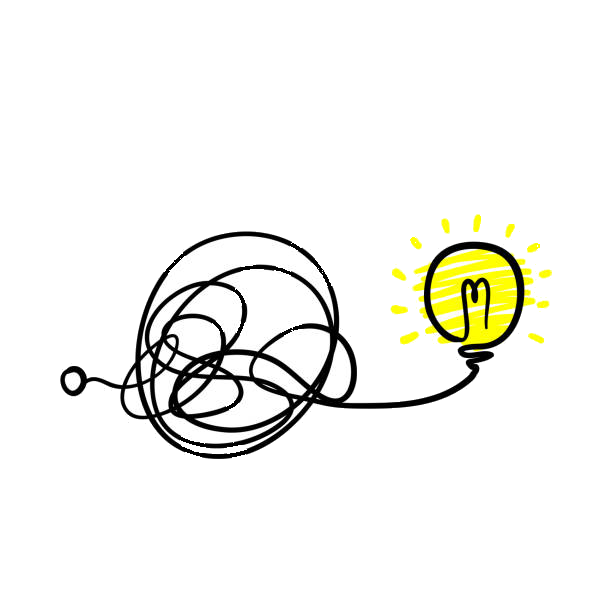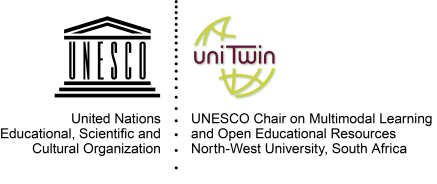About
About OERs and the OER fellowship
What are OERs?
Open Educational Resources (OER) are teaching, learning, and research materials that are either (a) in the public domain or (b) licensed in a manner that provides everyone with free and perpetual permission to engage in the 5R activities.
- Retain – make, own, and control a copy of the resource
- Reuse – use your original, revised, or remixed copy of the resource publicly
- Revise – edit, adapt, and modify your copy of the resource
- Remix – combine your original or revised copy of the resource with other existing material to create something new
- Redistribute – share copies of your original, revised, or remixed copy of the resource with others

The Unesco Chair
The establishment of a Chair on Multimodal Learning and Open Educational Resources (OER) at the North-West University (NWU) was recently approved by UNESCO. The Chair falls within the Research Unit Self-directed Learning (SDL) of the Faculty of Education.
The promotion of multimodal and self-directed learning has been identified as important aspects in the NWU Teaching and Learning Strategy as part of the university’s commitment to accessible and relevant high quality teaching and learning, with a view to enhancing student success as well as experience of the curriculum.
The research for this Chair will focus on multimodal learning (a blending of face-to-face and e-learning modalities) as well as the multiliteracies required for culturally appropriate and effective learning within an environment that is conducive to self-directed learning and Open Educational Resources (OER) (peer-reviewed shared online resources that include material, books, videos, lessons and even full courses).
The purpose of the research chair is to (1) build networks in Southern Africa around OER and multimodal learning, (2) build capacity at the NWU and in Southern Africa, (3) train and develop academic expertise among staff concerning multimodal learning and the creation and use of OER as well as (4) doing research on OER and multimodal learning.The NWU has already taken a leading role in promoting multimodal learning and research on OER in the region and internationally. The institution is a member of the National Association of Distance Education and Online Learning in South Africa (NADEOSA), Commonwealth of Learning, Open Educational Resources University (OERu) network and Apereo. In November 2013 the NWU joined the OER network as an anchor partner. The establishment of the UNESCO Chair was recommended by the NWU’s Institutional Committee for Research and Innovation on 14 September 2016. The formal agreement with UNESCO was signed on 15 April 2019.
The OER FELLOWSHIP:
Lecturing staff of the NWU are invited to apply to become an NWU Open Educational Resources (OERs) Fellow. This is an ideal opportunity for staff who are interested to include new online resources to their classes or adapt their resources to their students’ specific contexts to receive support and funding for creating or adapting open learning content as well as researching the process.
Our people
Dr Yolandi M. Coetser
Dr Yolandi M. Coetser holds a Dlitt et Phil in Philosophy from the University of Johannesburg. She is currently Senior Lecturer in Philosophy at the School of Philosophy at North West University (South Africa). Her research interest is environmental philosophy, with a specific focus on ecofeminism and African environmental thought.
Prof Chantelle Gray
Chantelle Gray is an Associate Professor in the School of Philosophy at the North-West University’s Potchefstroom campus. She completed her PhD at the University of Stellenbosch after which she held two postdoctoral positions, first at the University of Groningen and then at Unisa where she was later appointed as a Senior Researcher. Her research interests are wide and include Continental philosophy, African philosophy and decolonial studies, although she has a special interest in Deleuzoguattarian philosophy, anarchism, queer theory and critical algorithmic studies. She is the co-convener of the biennial South African Deleuze & Guattari Studies Conference (www.deleuzeguattari.co.za) and serves on the editorial boards of Somatechnics and Stilet. Her books include Deleuze and Anarchism, co-edited with Aragorn Eloff (2019, Edinburgh University Press) and Anarchism after Deleuze and Guattari: Fabulating Futures (2022, Bloomsbury).
Mx Aïda Terblanché-Greeff
Mx. Aïda Terblanché-Greeff is a lecturer at the North-West University. She is currently completing her PhD in Philosophy at the University of Johannesburg. Her research focus includes social philosophy and experimental philosophy. More specifically, cross-cultural research and empirically engaged African philosophy.
Ms Nolwandle Lembethe
Bio


